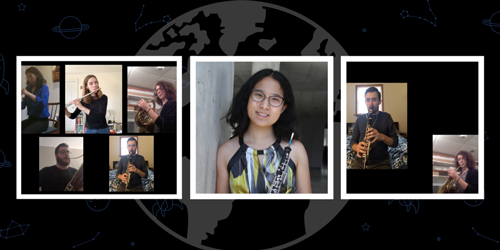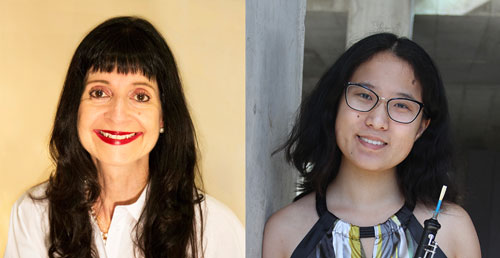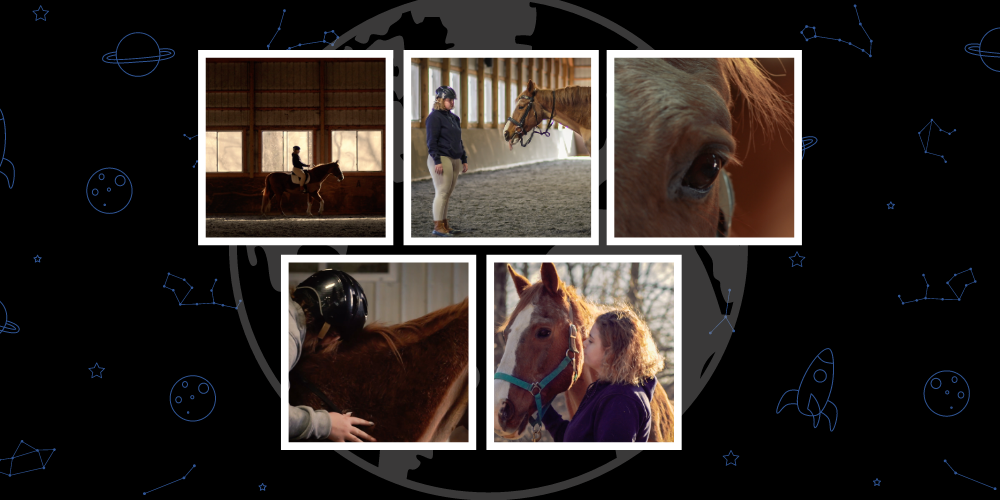Este mês o público pode assistir Canção Cigana, de Carmen, a lively performance from students at Bard College Conservatory of Music on the Planet Classroom Network YouTube Channel. The performance validates the age-old saying we’ve heard often during the pandemic: “The Show Must Go On!” The five musicians in the woodwind quintet, Collin Lewis, Jillian Reed, Kira Shiner, Eleni Georgiadis and Timothy Woerner spread throughout the county, flawlessly mesh together their individual parts to create a perfect arrangement of the classic song from the Bizet opera.
A Pesquisa Global para a Educação is pleased to welcome musician Kira Shiner.
Kira, such a great choice of music. I had not seen a woodwind quintet perform it before. How did the musicians work as a group even though you all played independently from your homes?
Working as an ensemble online was definitely a challenge. We met over zoom a few times before recording the piece to “rehearse” it, but since it was all online, we definitely had to rethink how that was going to work. One of the best methods we used was to have one person play while everyone else played along, but was on mute. This allowed us to hear how we were all interpreting the piece. From there we would then talk about tempo choices, articulation choices, etc., and then we repeated this until we were satisfied with what we came up with.
What do you see as the main pros and cons of performing a work such as this one in front of a live audience versus for an online audience?
I think the best thing about performing to an online audience vs. a live audience is that location is no longer a hindrance. The musicians and the audience members can be anywhere in the world. Since it’s online, often the videos are saved so if you miss the performance, often you can rewatch it however many times you want and whenever you want. This has allowed us, músicos, to reach a far wider audience and really connect with people around the world. Por outro lado, the biggest con of performing online is you don’t get the same interaction of musician to musician or musician to audience as you do in a live performance. There is something quite magical about performing and knowing you’re creating this shared experience with everyone in the room that you don’t quite get when you record by yourself.
Can you speak a little about the Gypsy Song from Carmen? What do you think makes this particular piece of music special for a woodwind quintet? What do you hope audiences will take away from your performance?
Gypsy Song happens right at the beginning of Act 2 of the opera. We find ourselves in a tavern and Carmen, along with friends Frasquita and Mercedes, are entertaining the officers. This song starts with a cheekiness and almost sensual feel to it. As the song continues, it becomes much more chaotic and celebratory as the tempo increases and the whole orchestra and chorus joins in for the last verse. This piece is perfect for woodwind quintet because it can very naturally be reduced to the five instruments. One of the challenges of playing an arrangement of a piece is losing something, whether it be a certain timbre, personagem, harmony, etc., that was present in the original. Since this piece already heavily features the winds with strings only doing a pizzicato accompaniment until the last verse, we find ourselves with an arrangement for winds that doesn’t feel like it’s missing a lot. Assim, us as musicians can still enjoy all the things we would enjoy if we were playing in a full pit orchestra. I hope audiences will be able to hear all the different characters of the piece come through and that they’ll have as much fun listening to it as we had making the video.
Onde você vê a performance musical indo nos próximos 10-15 anos? Quais são suas esperanças e sonhos para esta forma de arte?
I think music performance is on the brink of a big transition to something new. This pandemic has made every ensemble rethink how they interact with an audience. Over the next 10-15 anos, I think we’ll find a lot more orchestras/groups having a more online presence. Obviamente, I think live concerts will still be at the core of any ensemble, but I think to make the performance more accessible to other people, we’ll find that the ensembles are doing more video recordings that people can watch wherever they are and there will be more activity online, whether it be on a website or social media. Going forward, I think that’s really how the music industry is going to be able to reach audiences, especially when it comes to connecting with the younger generation. I think my main hope and dream for this art form, particularly in regards to classical music, is more representation. As an Asian woman, I would love to see more programs that feature music by women and BIPOC composers. Don’t get me wrong, I love a Beethoven symphony as much as the next person, but there is so much more great music written by people in minority groups that gets completely overlooked. And even if you look at the ensembles themselves, you’ll find that it is still predominantly Caucasian people, and honestly, still predominantly men that perform. I would love to see ensembles and music institutes around the world at the very least be open to having a conversation about this, because in my opinion, the best part about music is being able to share it and I, pessoalmente, think that we should be able to share it with everyone regardless of their background.
CM. Rubin and Kira Shiner
Now showing Canção Cigana, performed by students at Bard College Conservatory of Music, no canal do YouTube da Planet Classroom Network.







Comentários Recentes